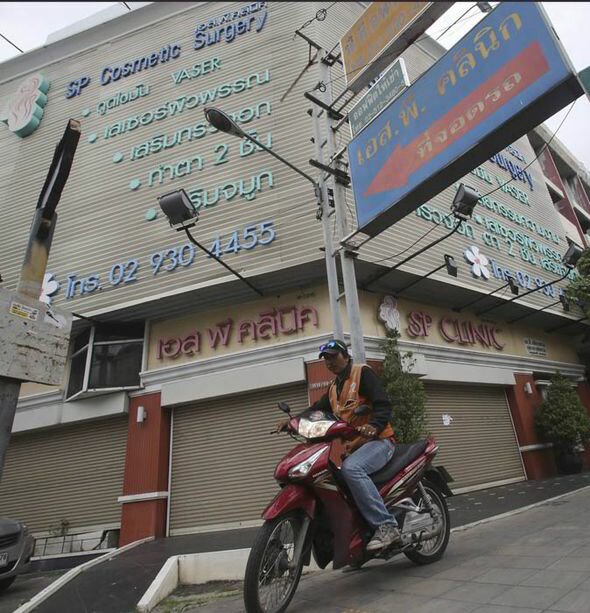Experts blast ‘medical tourism’ after British woman dies during Thai cosmetic procedure
Experts blast ‘medical tourism’ after British woman dies during Thai cosmetic procedure
AFTER the death of a British woman during a botched cosmetic procedure in Thailand, experts have spoken out against so-called “medical tourism”.
The woman, who has not yet been named, is understood to have died when she was given an intravenous anaesthetic as part of a procedure on her tailbone.
The doctor who carried out the operation was uncertified and has now been arrested and charged in connection with her death.
The tragedy echoes the death of Londoner Claudia Aderotimi, 20, who died when liquid silicone was injected into her buttocks in a procedure designed to enhance her bottom.
She arranged the surgery online and then travelled out to Philadelphia, USA, where the procedure was carried out in a hotel.
Ms Aderotimi experienced chest pains and difficulty breathing, then died (preliminary post-mortem examinations have shown) when her lung filled with silicone, causing a fatal embolism.
Research conducted by Confused.com in 2013 found that nearly a third (30 per cent) of Britons who have undergone cosmetic surgery travelled abroad to do so.
But many patients are left unhappy with their results – and in rare incidents like those mentioned above, even end up dead.
Last year a study by Leeds University into cosmetic surgery holidays revealed a shocking 16.5 per cent complication rate with nearly 1 in 10 (9 per cent) patients needing assistance from the NHS when arriving home.
It seems this is a growing trend – a survey of members of the British Association of Aesthetic Plastic Surgeons (BAAPS) found that over 60 per cent of surgeons reported an increase of 25-35 per cent in the number of patients seeking help for problems following cosmetic surgery performed abroad.
Michael Cadier, consultant plastic surgeon and President of BAAPS, said: “The health service at one stage was getting a lot of patients coming through with either dissatisfied or they’ve got problems following the surgery.
“I’ve been involved myself with patients who have had breast implants put in and the breast implant is popping out through the skin. I’ve had patients who had eyelid surgery and their eyes aren’t closing so they’re problems with exposure of the cornea.
“Those types of things are not common but certainly not an unusual event.”
Confused.com’s survey found that 25 per cent of people who travel abroad for surgery do so to save money.
Mr Cadier said: “It’s perceived as being cheaper. For example if you get a breast augmentation procedure undertaken in the UK, it costs between £4,000-£7,000, depending where in the country you get it done and by whom. In the far east you’re probably talking half that.
“But then you have to question how they’re making it so cheap.
“They’re using low cost implants and also the whole of the regulatory framework elsewhere in the world really doesn’t match up to the regulatory framework in the UK, Europe, America and Australia.
“If you’re going to Europe you’re less likely to be at risk but as soon as you venture outside Europe you really are exposing yourself to significant risk.
“Even if you go to Europe you’ve got the problem where you have a procedure, you come home and if there’s a problem or infection who do you speak to? Do you have to fly back to the person who carried out the procedure or present yourself to your local NHS hospital?

“It’s not like in the UK where if you have a cosmetic procedure and there’s then a problem – and problems do occur – you know exactly where to go.
“At the end of the day the reason it’s cheaper is that you’re going into an environment which may be significantly less safe than the environment in which you’d have surgery in the UK.”
Antonia Mariconda, founder of the Safety in Beauty campaign, is calling for operators of ‘cosmetic surgery holidays’ to be banned from advertising and recruiting in the UK.
She said: “We’ll be campaigning to ban cosmetic surgery tour operators advertising and recruiting for members of the public to go away to countries like Thailand and Europe to have cut price surgery.
“It is not a well-thought out decision because it is pressured with glossy adverts, time-linked incentives.
“The premedical questionnaires are not sufficient enough to warrant whether a patient is safe or medically fit to have surgery. Patients bypass procedures that you wouldn’t be able to bypass in the UK such as proper pre-screening and medical questionnaires.
“Ultimately the most important question which is often overlooked is ‘how do you know when you travel abroad for cosmetic surgery that the surgeon you’ve chosen is capable and qualified?’.
“That is the last question that anyone asks. Today’s unfortunate case is testimony to the fact that it is not asked.
“If your decision or your motivating factor for going abroad for cosmetic surgery is money then at what price do you have to seriously reflect upon the value of your life?
“Because if it’s going to cost you £3,000 more in the UK, then that’s the price of your life.
“My message is to stay in the UK, find a surgeon that you know you have the resources to check that they are properly qualified.”
Pin It

